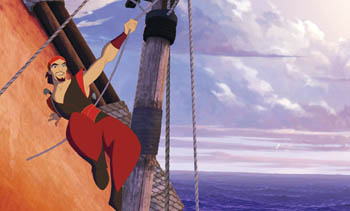![[Metroactive Movies]](/movies/gifs/movies468.gif)
[ Movies Index | Show Times | Silicon Valley | Metroactive Home | Archives ]
Sinbad to the Bone
DreamWorks' hero shades from rogue to jerk
By Richard von Busack
THE FIRST TALES of Sinbad the Mariner--raised in Baghdad, sailed from Basra--were first recorded about 1350. In piety, poetry and shrewd observation of the harshness of the world, the tales reflect Islamic culture: "Each voyage is a wonderful tale that confounds the mind, and each thing happened by fate and divine decree, as there is no escape or refuge from that which is preordained"--Husain Haddaway's translation of The Arabian Nights. During a time when so many Americans are coming smash up against the world of Islam, the new animated feature Sinbad: Legend of the Seven Seas offers a chance to revisit these gripping but beautiful stories. Even the gimcrack Orientalism of the Ray Harryhausen/Charles H. Schneer version of the 1950s taught American children a little something--in the same basic way that Persian rugs, the musical Kismet and Omar Khayyam's poetry once informed the Midwest about the Near East. Kerwin Mathews in The 7th Voyage of Sinbad (1958) saying "Trust in Allah, but tie your camel" was as close as Hollywood got to multiculturalism. So turning Sinbad into an ancient Greek, as DreamWorks has, is worse than making a cheerful vaudeville out of Aladdin.
Also, this cartoon has a problem with the thin line that separates "rogue" from "jerk." Not realizing that a voyage is as good a story arc as there is, credited scriptwriter John Logan decided to have Sinbad gradually realizing an important lesson about the importance of unselfishness. Until that happens, he's annoyingly cool and boastful. The film begins with Sinbad (voiced by Brad Pitt) as a pirate raiding the vessel of an old friend named Proteus (Joseph Fiennes). Sinbad is trying to get his hands on the Book of Peace, a supernatural item that brings light to the sea-kingdom of Syracuse. A fun-seeking Eris, goddess of discord (Michelle Pfeiffer), steals the book, and sets Sinbad off on a quest to the kingdom of Tartarus to retrieve it. Stowing away aboard his ship is Marina, a princess (Catherine Zeta-Jones).
The one outstanding sequence has the Sirens bewitching Sinbad as he negotiates a set of rocks and shoals; Marina, a woman immune, has to take the wheel to get them out. Outside the technical achievement of the animation--an attack by a sea serpent that looks like Cthulu's twin brother and a chase from a roclike giant snow eagle--this Sinbad is full of motion but not drama. It's all a study for an impending video game. The movie flatlines when Eris isn't around. She knows how to make an entrance. Swirls of fractals weave themselves into a goddess; she coalesces rather than materializes. She resembles a liquefying female thief named Inque on TV's Batman Beyond, but she towers over Sinbad, like the gods did in the Harryhausen animated Jason and the Argonauts. Too bad their rapport plays out as wisecracking kid and bad mommy. In childhood, I preferred heroes--whether Errol Flynn or Bond or Sinbad--who were as smooth with the ladies as I wanted to be someday. The schoolyard spatting here (it's the Spielberg touch) would have seemed like icky kid stuff even when I was an icky kid.
[ Silicon Valley | Metroactive Home | Archives ]
![]()

Setting Sail: The famed adventurer embarks on an animated voyage in 'Sinbad: Legend of the Seven Seas.'
Sinbad: Legend of the Seven Seas (PG-13; 86 min.), directed by Tim Johnson, written by John Logan and starring the voices of Brad Pitt, Michelle Pfeiffer and Catherine Zeta-Jones, plays at selected theaters valleywide.
Send a letter to the editor about this story to letters@metronews.com.
From the July 3-9, 2003 issue of Metro, Silicon Valley's Weekly Newspaper.